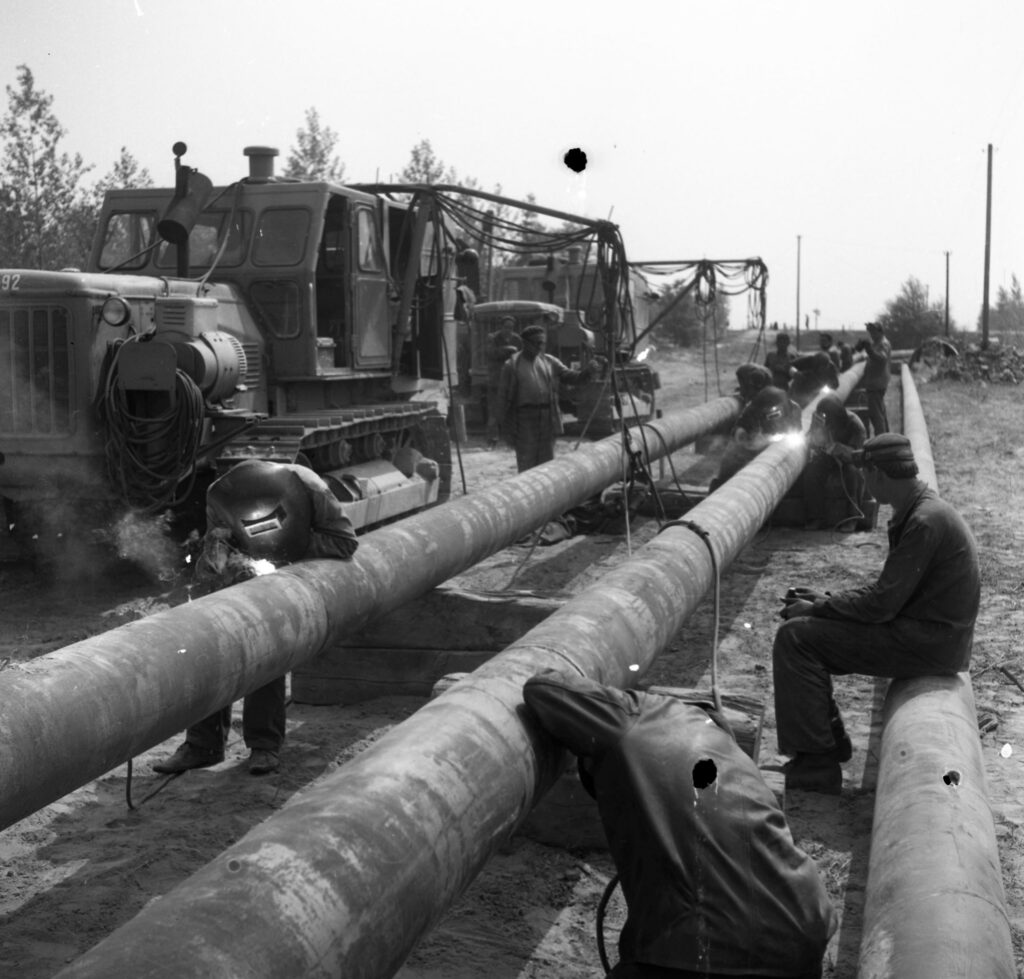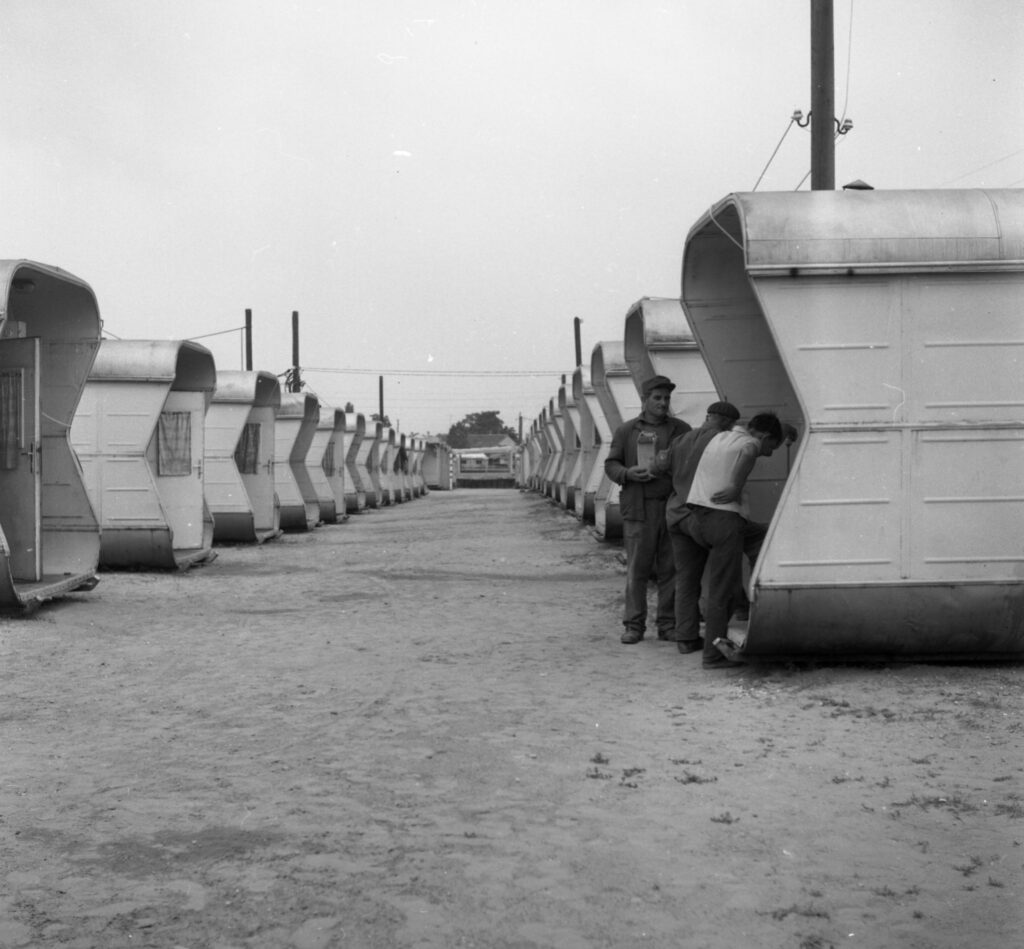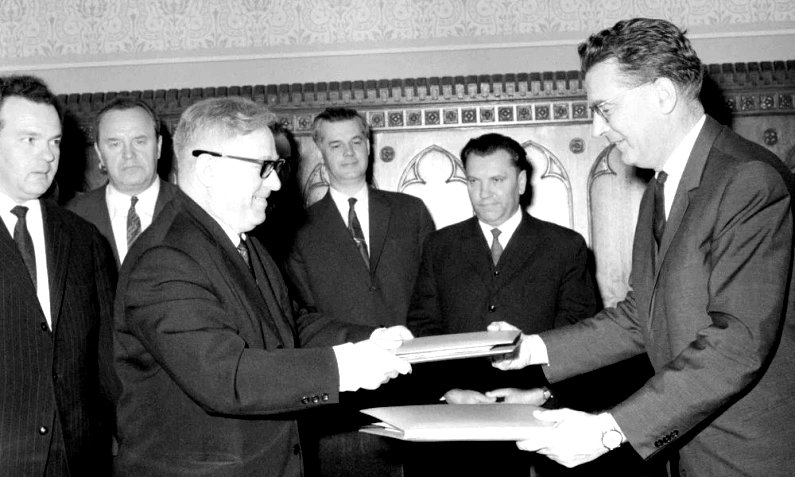In July 1980, the III/II Group Chief of the State Security, i.e. counterintelligence, launched an investigation under the code name "Traitors". The two people suspected of espionage were István Russay and Heinrich Korzil, the two protagonists of our oil story. In recent weeks, you have already read about the not-so-glorious background of the CEO of Mineralimpex and the Austrian businessman, as well as how they created their joint venture specializing in oil trade, Vienna's Mineralkontor.
The counter-espionage began investigating István Russay because it was revealed that he had discussed with a department head of the Ministry of Foreign Trade how to prevent the success of the Hungarian-Soviet trade negotiations so that "they could not be legally involved in it".
The unnecessary middleman
From the surviving documents, we cannot determine exactly what kind of negotiations it might have been, but it is certain that Russay wanted to somehow manipulate agreements related to the delivery of energy carriers according to his own interests. The trade in Russian oil was a very important source of income for our country, you could have read about it a few weeks ago: we earned roughly 300 million dollars a year from selling the unused part of the oil we bought at a discount to the West. The trade of energy carriers - including oil - was handled by Mineralimpex, but after 1973, with the incorporation of the Viennese subsidiary, Mineralkontor, the profits were skimmed into their own pockets.
The export of gasoline received from the Soviet Union to the West and the unnecessary involvement of Mineralkontor are causing significant damage to the national economy, the counterintelligence agency found. Mineralkontor was an extremely profitable enterprise. Until 1990, it was granted the exclusive right to distribute mineral oil and mining products in relation to Austria, Switzerland and the Federal Republic of Germany, thereby handling 35% of Hungarian-Austrian foreign trade in the 1980s. And from January 1, 1984, the joint venture received unconditionally from Mineralimpex "the right to single sale, and imports were carried out with its involvement" - the state security summarized the company's responsibilities. All this meant that trade in energy carriers could only be conducted through the Mineralkontor in Vienna. State-guaranteed embezzlement.
Bankers in the background
In 1973, a secret agreement was made between Russay and Korzil that part of the company's profits would be deposited in a Swiss bank account. According to the annual accounts and statements, although Mineralkontor did not make a profit (therefore it did not pay taxes either), the allegedly non-existent profit was transferred to Cantrade Bank in Zurich through the 1999 account of Magyar Külkereskedelmi Bank (MKB), on which half of the two businessmen partially shared. All of this was discovered by the state security investigation, and the amounts that moved between the mentioned accounts at the time of the surveillance were also recorded. Before looking at the magnitude of the series of frauds we are facing, it must be emphasized that the involvement of the MKB in the movement of illegal income indicates that the activity damaging the country cannot be considered the personalization of Russay and Korzil.

Construction of the Friendship II crude oil pipeline in Zsámbé (photo: Tamás Urbán)
Kápolnásnyék, September 19, 1962. The Hungarian section of the Barátság crude oil pipeline begins at Ipolyság, from where a 145 km long pipeline takes it to Kápolnásnyék. A so-called pipe ferret traveled at the beginning of the oil column, which made the journey from the border in 46 hours. This was the first shipment. MTI Photo: György Lajos
When Mineralkontor was founded, the head of MKB István Salusinszky , MNVK-2. a banker working as a winner, who was one of the main promoters of the decree enabling the establishment of joint ventures and Russay's patron. (According to state security documents, he may have had a hand in the fact that Russay, who had fallen out of favor due to corruption in the 1960s, suddenly found himself in the CEO seat of Mineralimpex.) The bank manager not only oversaw Mineralkontor's finances, but also had a say in its business deals, as MKB's own company , Centropa, also based in Vienna, joined the activities of Mineralimpex's Viennese subsidiary. (Centropa grew out of a Swiss holding of the same name, the exciting history of which has already been read in this series.) In 1983, the counterintelligence learned that the director of Centropa, Anton Haim, had been acting as an agent for Mineralkontor for ten years: the distribution of paraffin will receive a 3% commission from the company. According to the body's findings, this contradicted the trade policy direction of the Ministry of Foreign Trade, but the relationship could not be terminated because the former head of MKB - that is, Salusinszky - "personally requested [...] that the agent continue to be employed". Salusinszky was succeeded in 1980 by Sándor Demcsák , who already managed MKB during the "heyday" of the Mineralkontor fraud series.
How much is that much?
The 1999 invoice was "top secret" and included four items of $22 million to $25 million each at the time of the investigation -- or nearly $100 million. (Calculated at the exchange rate of 1984, 100 million dollars was worth 4.8 billion forints, the value of which today would be 120-130 billion forints! This is only the part of the profit that went to Russay and Korzil!) The money in the account was transferred to the account of a company called André transferred regularly. The André company from Lausanne appeared in the documents as a prominent business partner at least from the beginning of the 1960s.
As an agent of state security, János Fekete reported to his officers in the 1960s that corruption could be behind economic cooperation.Although we do not know much about the owners of André, it is certain that they maintained close relations with the management of Magyar Külkereskedelmi Bank: when the company's head, Friedrich Schenk arrived in Hungary, he held negotiations in the MKB building. The exceptional situation of André deserves attention not only in the Hungarian context, but also in the Western context.
"The André company, as a world-leading company, has worked unhindered with socialist countries so far, and can conduct transit business even after joining the Common Market. The company's great authority makes unimpeded trips here possible when the Swiss authorities register businessmen traveling to Hungary and those using Hungarian aircraft," the counter-intelligence agency summarized based on the data collected by them.

Accommodation for oil pipeline builders in Dunaharaszti (photo: Tamás Urbán)
In the course of the investigation, additional accounts involved in the abuse were discovered, which were also kept at the Magyar Külkereskedelmi Bank. A part of Mineralkontor's untaxed income was transferred to the 1954 account, 50% of which went to Switzerland - Russay and Korzil shared it half-and-half -, the remaining part, according to official claims, improved the efficiency of Mineralimpex, although based on a later information, the BM came to the conclusion that the legal income of Mineralkontor was used for a share capital increase, so that not a penny of it went to the parent company and the Hungarian national economy. In ten years, the company's share capital was increased from 400,000 schillings to 30 million schillings. According to the MKB statements, between 1977 and 1983, a total of 75 million schillings were transferred to this account, in 1984 24 million schillings were transferred to it, there are no data from 1985 in the reports, but in the first half of 1986 another profit transfer of 12.5 million schillings was received by the bank.
According to the data of the investigation in April 1988, between 1977 and 1988 a total of about 160 million schillings passed through the account in question.This does not seem so little, especially for a company that, according to the official accounts, did not produce any profit.
Account 35010 was opened in 1980, also at the Magyar Külkereskedelmi Bank, which was used to cover Mineralkontor's losses and ensure the constitutional budget. I would like to draw your attention to the purpose of the two accounts: one managed Mineralkontor's income - apparently with continuous cash flows, which primarily ensured the embezzlement of profits - and the other received amounts transferred from the parent company to cover losses. Between 1980 and 1984, 70 million schillings were allocated to the latter. It was customary to finance the constitutional budget (which was primarily used for commercial commissions, i.e. pre-calculated corruption payments) from the parent company's budget, and the compensation of the losses was also borne by the company listed as the owner, i.e., in addition to the embezzled amounts, many millions of schillings were taken from Mineralimpex to compensate them. And Mineralimpex was a state-owned company, like all companies under socialism, so the loser of the embezzlement was the Hungarian state treasury and the working Hungarian people.
At the forefront
Russay's office room was bugged by state security, so they could learn about other manipulations as well. For example, they overheard a conversation between the company manager and the chief accountant, in which the exchange of ideas was about how 10-12 million schillings could be booked into an account from which the amount could be transferred to Austria without paying taxes. They saw the solution in keeping the amount in Hungary, not accounting for it, and in the event of an audit, they would state that the amount of money in question is in the account of Mineralkontor, while in Vienna they would prove the opposite. A few days later, there was already a discussion between Korzil and Russay about how to save five million schillings to Austria tax-free. They came to the solution that Mineralimpex would transfer ten million schillings to Mineralkontor to improve its creditworthiness, but at Heinrich Korzil's request, the transfer would be made via London, because this way the name of the Austrian party could be listed as the owner of half of the amount.
It also emerged from the conversation between the two managers of Mineralkontor that they were looking for a reliable person for the Viennese company who knows computer systems and can constantly monitor the company's 8-9 billion (!) turnover. Although the currency was not mentioned during the conversation, since we are talking about a company operating in Austria, we obviously have to think of schillings - in the case of such an amount of turnover, the contemporaneous statement that the Hungarian joint venture was among the thirty largest companies of our western neighbor (!) could not be an exaggeration. They understood well.
Among the economic enterprises of capitalist Austria, which provides a very high standard of living for its citizens, this company, founded on Hungarian initiative and partly owned by Hungarians, was among the most successful enterprises, while our country was fatally in debt. In vain, they already knew then that they should not open a pastry shop in Vienna...What did Mineralkontor do to be considered such a successful company in Austria? How is this story related to the Iranian hostage drama mentioned a few weeks earlier? Let's continue from here!
Source: PestiSrácok
Author: historian Zsuzsanna Borvendég
(On the cover photo: Soviet-Hungarian national economic planning agreement in 1965. / MTI Photo: Ferenc Vigovszki)












